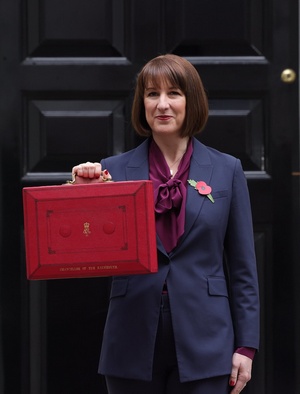Slicing the pork barrel thin
 The Labour Party’s new autumn budget, presented by Chancellor Rachel Reeves, has made notable changes to universal credit and other benefits. However, these updates have raised concerns for vulnerable communities.
The Labour Party’s new autumn budget, presented by Chancellor Rachel Reeves, has made notable changes to universal credit and other benefits. However, these updates have raised concerns for vulnerable communities.
We’ve been speaking with people currently on benefits, universal credit, and Personal Independence Payments (PIP) about their experiences in the UK today.
Claire, 35, who transitioned from ESA to universal credit and works part-time in administration in Sheffield, is disabled due to genetic and autoimmune conditions. She also receives PIP. Claire says ‘The job centre is horrible; it’s not set up to support disabled people properly. They lack time, resources, and training.’
Toni, 44, is self-employed in events management in London, but her part-time universal credit isn’t enough. ‘I was fine when I worked in Europe; my business thrived for nearly a decade. But since Brexit, the cost of living crisis, and COVID, my business has tanked. Event venues are closing, and there are no opportunities for those without access to Europe. I have no options unless I retrain at my age!’
Starting in April 2025, benefits including universal credit will rise by just 1.7 percent. This means only a few extra pounds per month for claimants who have been struggling to make ends meet from one capitalist crisis to the next.
Claire believes the support is inadequate for disabled individuals wanting to work, saying it falls short of previous options like disabled tax credits, which provided more effective assistance.
Reeves announced a cap on universal credit deductions for debt repayments, lowering it from 25 percent to 15 percent of the standard allowance. This aims to ease financial pressure for over a million households, potentially saving them around £420 a year.
‘It’s disheartening,’ Claire reflects, on her feeling of alienation from society. When asked about the impact on her mental health, she added, ‘Yes, the challenges of universal credit deepen my sense of isolation.’
Toni feels society has abandoned her: ‘I worked hard for years and paid into the system, but when COVID hit, my business got no help. I was dumped on the dole and left to fend for myself, which only makes me feel more alienated’.
Claire adds ‘They’re just continuing the previous government’s policies. I didn’t agree with them then, and I still don’t. The system doesn’t support disabled people or consider different levels of disability.’
They’re also concerned about the new measure allowing the DWP direct access to bank accounts. This approach to combating fraud feels like a surveillance tactic that will erode trust among unemployed workers. What they feel they need are real job opportunities, not increased government intrusion into their lives.
Labour will uphold the Conservatives’ reforms to the work capability assessment, making it harder for disabled workers to qualify for the highest level of incapacity benefits. This could affect over 420,000 people, resulting in a loss of about £5,000 in annual support for many.
A new £240 million ‘Get Britain Working’ initiative aims to provide work, skills, and health support for people with disabilities and long-term health conditions. This includes the already controversial idea of sending job coaches into mental health wards to push the severely ill back into work.
The earnings threshold for carer’s allowance will rise to £10,000 a year, allowing more unpaid carers to qualify for support. However, we note that the broader social care system remains underfunded and profit-driven.
Labour has also decided to keep the two-child limit on benefits, which denies extra support for families with more than two children and pushes many deeper into poverty.
Claire expressed her concerns about no longer receiving cost of living payments and the reduced eligibility for the Warm Home Discount, making it harder for her to heat her home amid rising costs.
The budget fails to adequately address the financial strain on the UK’s most vulnerable. Small increases, targeting the working poor with threats of prosecution and debt recovery measures, don’t meet the real needs of those struggling, especially when many families rely on food banks or multiple jobs just to get by.
Claire remarked, ‘We will struggle even more than before.’ She envisions a truly socialist society prioritising adequate material support and holistic health care for everyone.
Neither the Labour Party nor the Tories can solve these issues. The current government may offer minor increases, but they remain trapped in a system that prioritises market whims over people’s needs. ‘The market giveth, and the market taketh away.’
Names have been changed to avoid potential targeting or sanctions.
A.T.
